Top 10
Legends of the Pitch: Top 10 Football Players of All Time
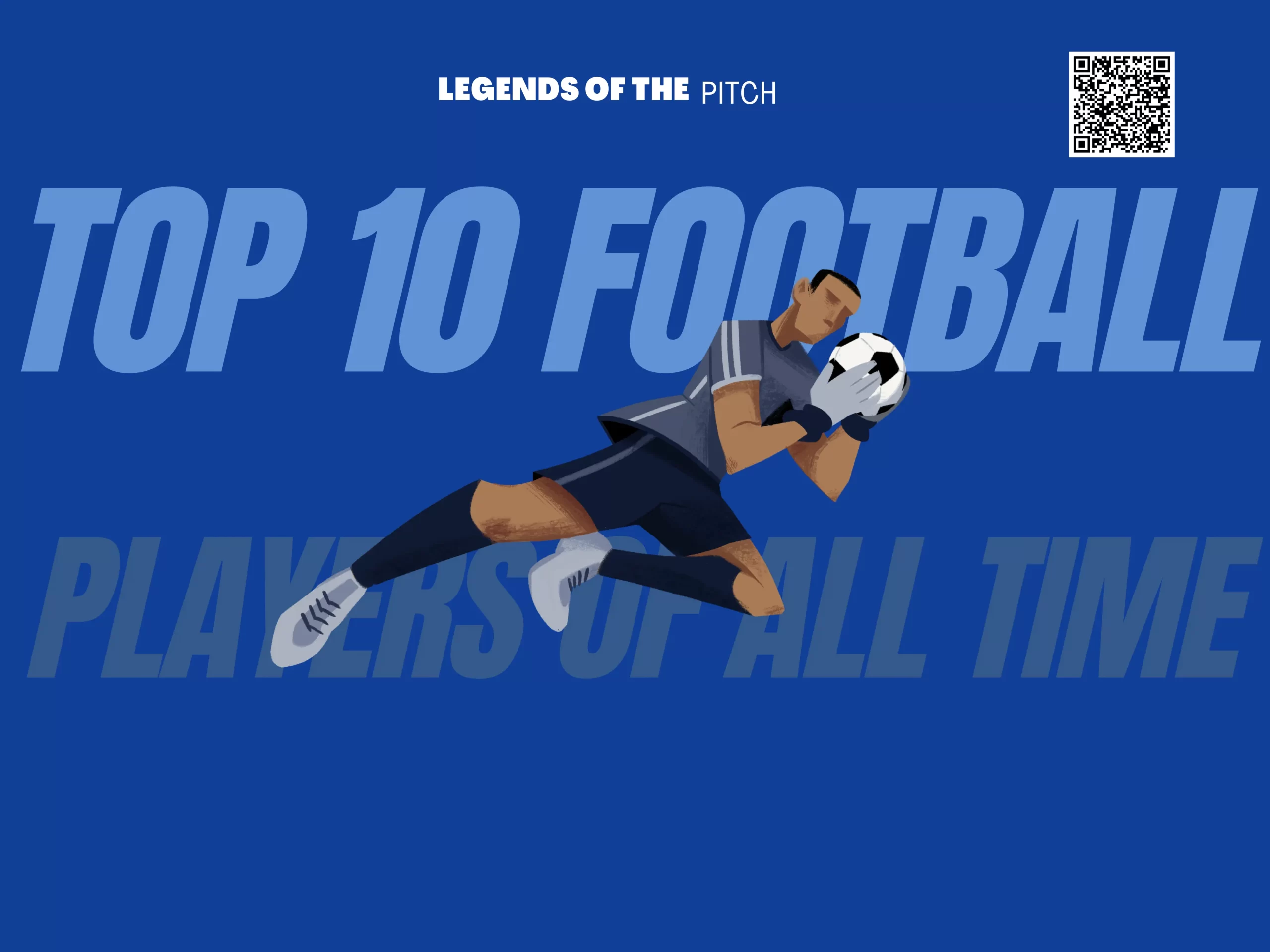
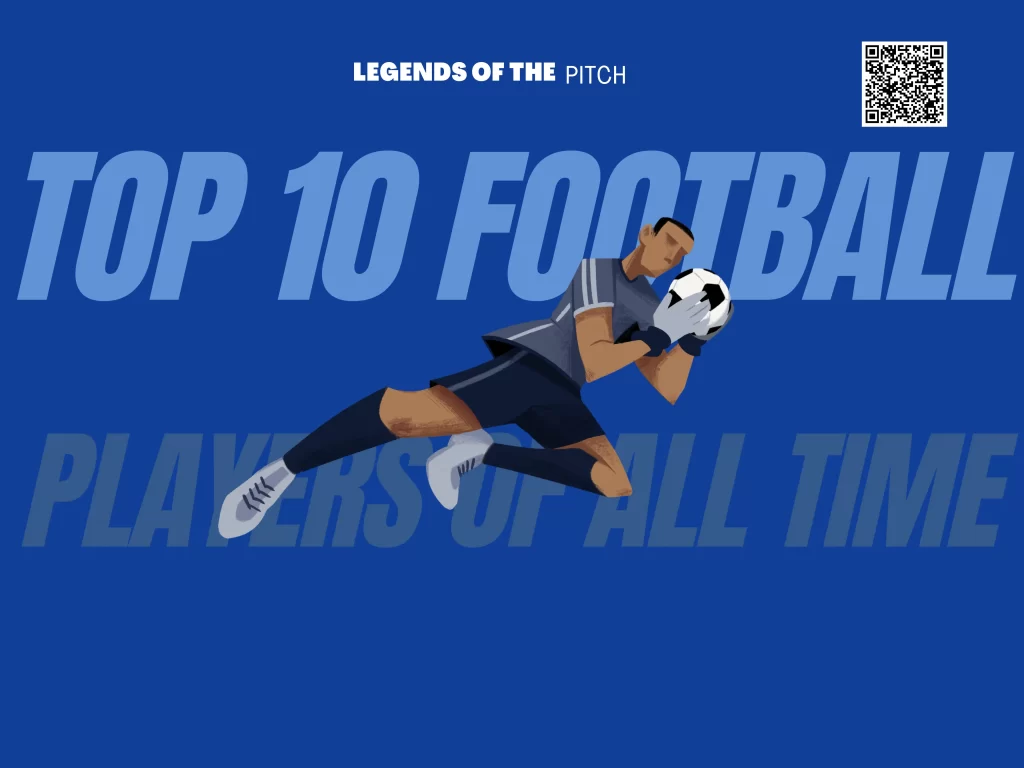
Football, or soccer as it’s called in some parts of the world, is a team sport that involves kicking a ball to score goals. The beautiful game features a variety of positions, each requiring a unique skill set. Here are the different types of football players:
10. Alfredo Di Stéfano: The “Saeta Rubia” Who Lit Up Football
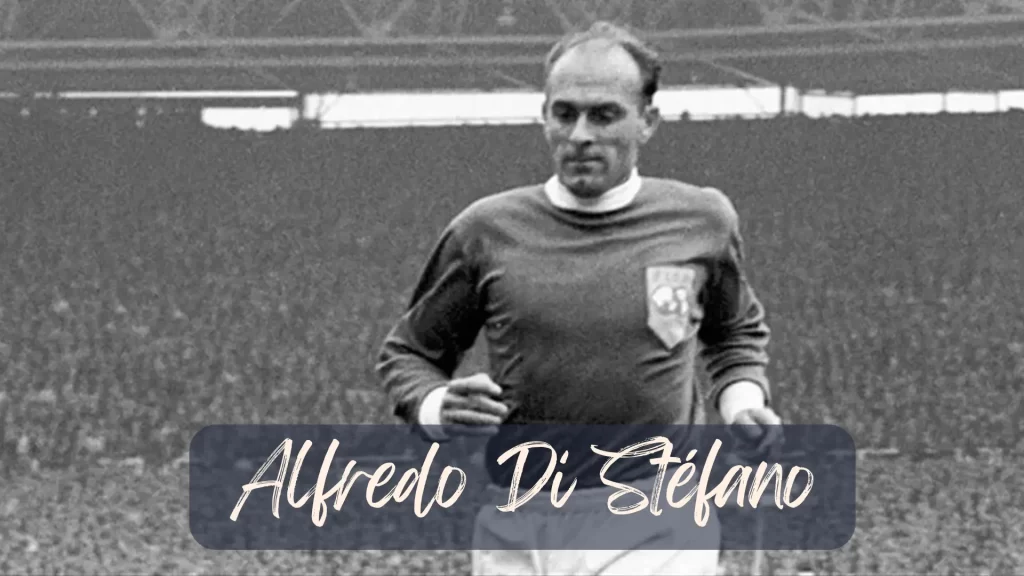
Alfredo Di Stéfano was an Argentine-born footballer, widely regarded as one of the greatest players of all time. Nicknamed “Saeta Rubia” (Blonde Arrow), his career was marked by exceptional skill, leadership, and a relentless drive to win.
Early Career and South American Success:
- Began his professional career at River Plate in Argentina at 17.
- Won the Argentine Primera División and Copa Aldao with River Plate in 1947.
- Played for Argentina, helping them win the South American Championship in 1947.
- A footballer’s strike led him to Colombia, where he thrived with Millonarios.
Legendary Years at Real Madrid:
- Signed by Real Madrid in 1953, sparking a transfer controversy.
- Became a cornerstone of Real Madrid’s dominance in the 1950s and 60s.
- Won a staggering eight La Liga titles and five consecutive European Cups (a feat yet to be repeated).
- Earned two Ballon d’Or awards (1957, 1959) as the European Footballer of the Year.
- Renowned for his all-around ability – scoring goals, creating plays, and inspiring teammates.
International Career and Legacy:
- Played for both Argentina and Spain due to the transfer dispute.
- Though limited in international appearances, his impact on club football is immense.
- A prolific goalscorer, he remains Real Madrid’s leading scorer in El Clásico alongside Cristiano Ronaldo.
- Considered a game-changer, Di Stéfano revolutionized attacking play with his pace, power, and technique.
Beyond Playing:
- After retiring, Di Stéfano embarked on a successful managerial career.
- He remains an iconic figure in football history, revered for his achievements and influence on the sport.
In conclusion, Alfredo Di Stéfano was a true footballing legend. His exceptional talent, leadership, and winning mentality left an indelible mark on the game. His legacy continues to inspire players and fans alike.
Club Kings: The Top 10 Teams Ruling Football
9. Ronaldo (R9): The Phenomenon
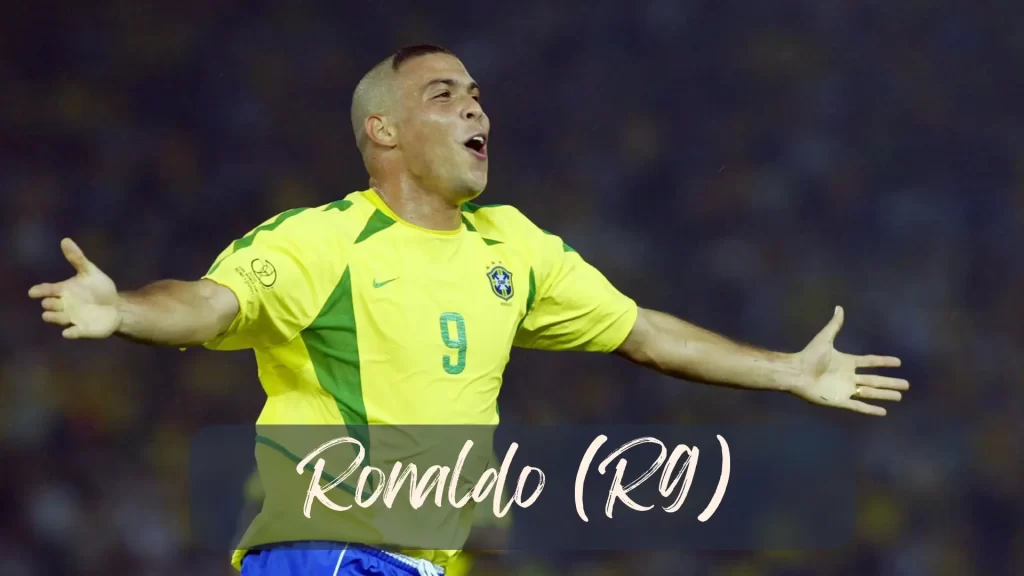
R9 is most commonly associated with the legendary Brazilian striker Ronaldo Luís Nazário de Lima. Nicknamed “O Fenômeno” (The Phenomenon) for his incredible speed, dribbling ability, and finishing skills, Ronaldo is widely regarded as one of the greatest footballers of all time.
Here are some key points about R9’s illustrious career:
- Prolific Goalscorer: Ronaldo scored over 450 goals in his professional career, including winning the FIFA World Cup Golden Boot in 2002.
- World Cup Champion: He was a key member of Brazil’s World Cup-winning teams in 1994 and 2002, even overcoming a serious injury in 1998 to lead Brazil to victory in 2002.
- Individual Accolades: Ronaldo won the prestigious Ballon d’Or award for the best player in the world three times (1997, 2002, 2003).
- Club Career: He played for some of the biggest clubs in the world, including PSV Eindhoven, Barcelona, Inter Milan, Real Madrid, AC Milan, and Corinthians.
- Legacy: Despite battling injuries throughout his career, Ronaldo’s impact on the game is undeniable. His pace, power, and technique revolutionized the striker position, inspiring generations of players who came after him.
Additional Notes:
It’s important to remember that R9 is not an official designation, but rather a nickname. There have been other players who have worn the number 9 jersey and achieved great things, but Ronaldo’s achievements solidify the association of R9 with him.
Beginner’s Guide to Building Superhero Strength (without the gamma rays!)
8. Zinedine Zidane: The Elegance of French Football
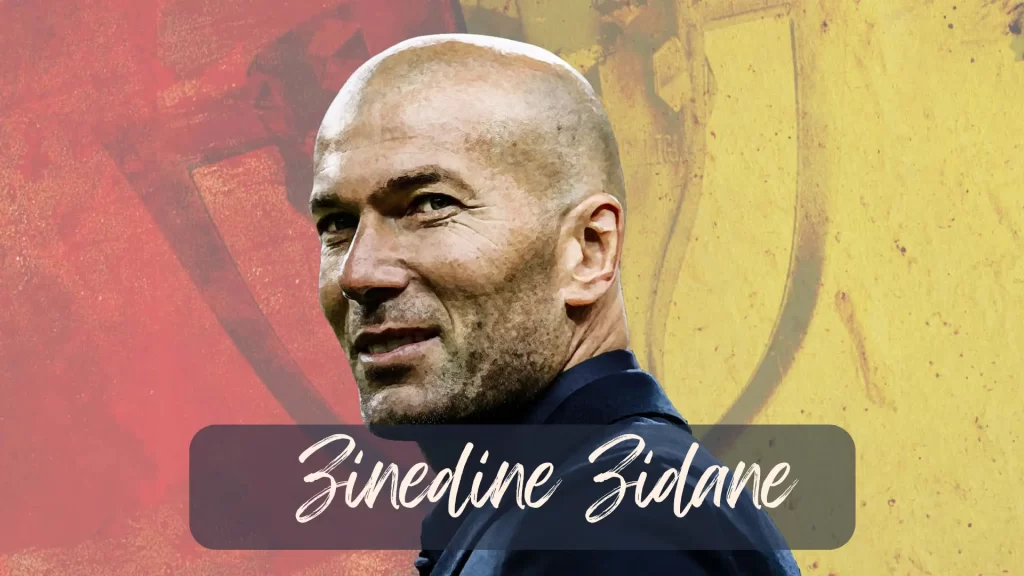
Zinedine Zidane, or “Zizou” as he’s affectionately known, is a name synonymous with grace, power, and pure footballing genius. A French attacking midfielder, Zidane’s career spanned four clubs and the French national team, etching his name not only in club folklore but also in the hearts of football fans worldwide.
Early Life and Club Career
Born in Marseille in 1972, Zidane’s talent shone through at a young age. He began his professional career at Cannes before establishing himself as a star at Bordeaux. In 1996, the Italian giants Juventus came calling, and Zidane thrived in Serie A. He was instrumental in their Champions League victories in 1996 and 1998, showcasing his incredible vision and ball control on the biggest stage.
A National Hero
However, it was on the international stage that Zidane truly cemented his legacy. Leading the French national team for over a decade, he captained them to a historic World Cup victory on home soil in 1998. His two goals in the final against Brazil sent the nation into euphoria, solidifying his status as a national hero. Two years later, he added the European Championship title to his collection, being named Player of the Tournament.
Real Madrid and Retirement
In 2001, Zidane made a record-breaking move to Real Madrid, becoming the most expensive player in the world at the time. His spell at the Spanish giants was nothing short of spectacular. He orchestrated their long-awaited Champions League triumph in 2002, scoring a stunning volley in the final against Bayer Leverkusen. His final professional season was in 2006, when he bowed out with elegance, leading France to the World Cup final despite a controversial red card in the final match.
Individual Accolades
Zidane’s trophy cabinet is overflowing with individual accolades as well. He won the prestigious Ballon d’Or award in 1998, adding to his three FIFA World Player of the Year awards. His exceptional technique, passing ability, and leadership qualities made him a complete footballer, admired by fans and respected by opponents.
Impact on the Game
Zidane’s impact on football transcends his trophies. His elegant playing style, characterized by close control and audacious flicks, inspired a generation of players. He remains a role model not just in France but on the global stage, revered for his dedication, sportsmanship, and the sheer joy he brought to the beautiful game.
Zinedine Zidane’s legacy extends far beyond his playing days. He has successfully transitioned into management, winning numerous trophies with Real Madrid. Whether as a player or a manager, Zidane’s influence on football is undeniable, securing his place as one of the greatest footballers of all time.
7. Franz Beckenbauer: The Emperor Who Reigned Supreme
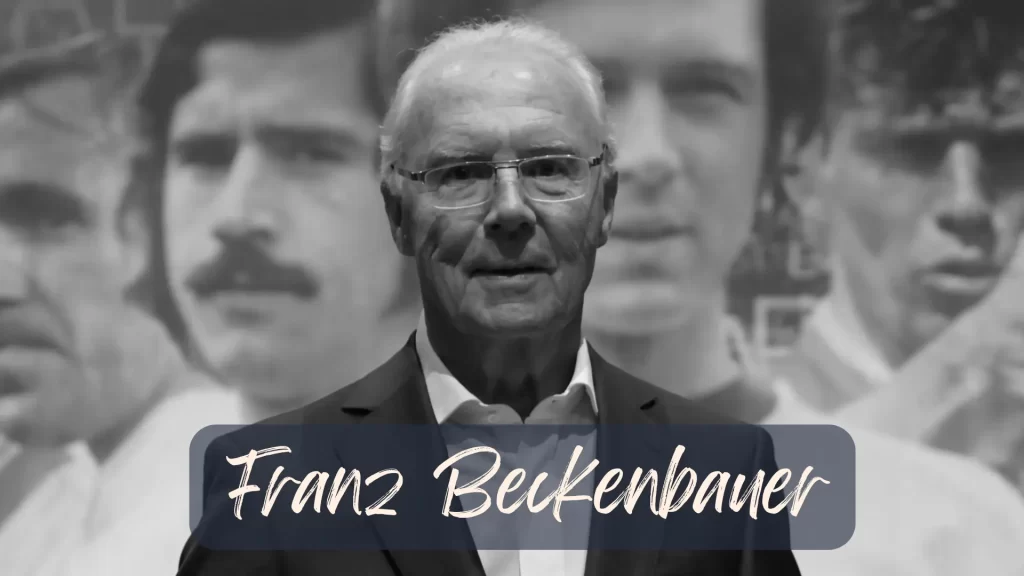
Franz Beckenbauer, nicknamed “Der Kaiser” (The Emperor), is a legend who transcended football. He dominated the sport for over two decades, leaving an indelible mark on both club and international football. This article explores the illustrious career of Beckenbauer, the revolutionary defender, and his countless achievements.
Early Life and Rise to Prominence:
Born in Munich in 1945, Beckenbauer’s talent was evident from a young age. He joined Bayern Munich’s youth academy at 13 and quickly rose through the ranks. His elegance, vision, and intelligence on the field defied the traditional role of a defender. Beckenbauer pioneered the sweeper position, venturing forward to initiate attacks with his pinpoint passing and long runs.
Club Football Glory:
Beckenbauer’s leadership qualities blossomed as he captained Bayern Munich to immense success. They conquered the Bundesliga four times and achieved European glory by winning three consecutive European Cup titles (now the Champions League) from 1974 to 1976. These victories cemented Beckenbauer’s reputation as one of the greatest defenders the game had ever seen.
International Hero:
Beckenbauer’s impact extended far beyond club football. He captained a dominant West Germany side, leading them to victory in the 1972 European Championship. The pinnacle arrived in the 1974 World Cup on home soil. Despite facing a strong Dutch team, Beckenbauer’s leadership and defensive prowess were instrumental in West Germany securing their second World Cup title.
Individual Accolades:
Beckenbauer’s brilliance was recognized beyond trophies. He received the prestigious Ballon d’Or, the award for the best player in Europe, twice in 1972 and 1976. He remains the only defender to achieve this feat. Beckenbauer was also named German Footballer of the Year four times, a testament to his consistent excellence.
Life Beyond Playing:
Following his retirement, Beckenbauer continued his love affair with football, transitioning into management. He replicated his playing success, leading West Germany to another World Cup victory in 1990. This remarkable achievement placed him in a select group of individuals who have won the World Cup as both player and manager.
Beckenbauer’s Legacy:
Franz Beckenbauer’s influence on football is undeniable. He redefined the role of a defender, inspiring generations with his attacking flair and tactical intelligence. His leadership qualities and winning mentality remain an inspiration for players and coaches alike. “Der Kaiser” will forever be remembered as an emperor who reigned supreme on the football pitch.
6. Ferenc Puskas
The Galloping Major: Ferenc Puskas and a Legacy Etched in Football History
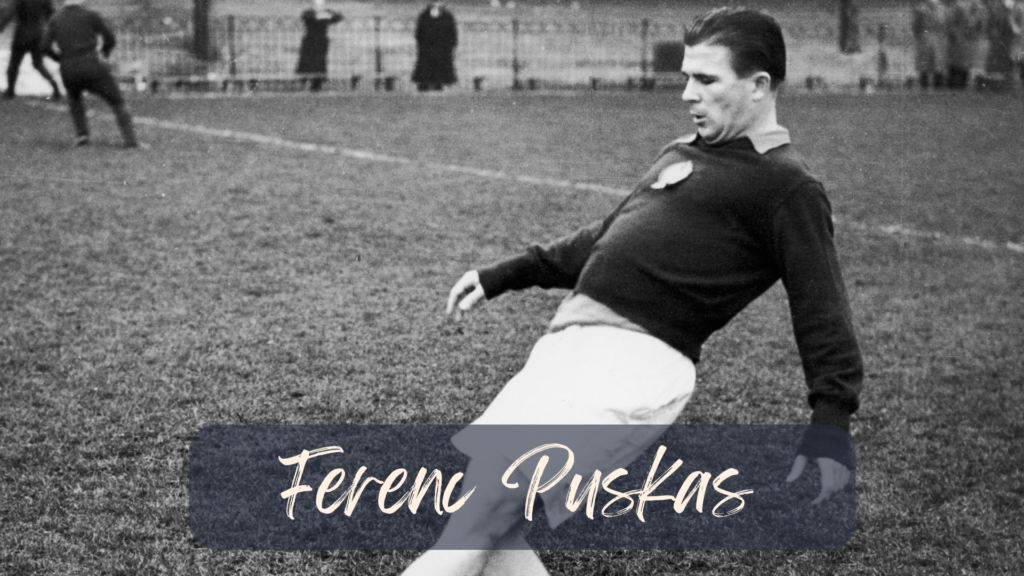
Ferenc Puskas, a name synonymous with elegance, power, and unmatched goalscoring prowess, was more than just a footballer – he was a legend who transcended eras and captivated audiences worldwide. Born in 1927 in Hungary, Puskas’ career mirrored the highs and lows of his nation’s footballing journey.
The Mighty Magyar and the Golden Boot
Puskas rose to prominence with the Hungarian national team, nicknamed the “Mighty Magyars.” This team, boasting incredible talent, dominated international football in the early 1950s. Puskas, the spearhead of this attack, was a prolific scorer, netting a staggering 84 goals in just 85 international appearances. He led Hungary to Olympic gold in 1952 and to the final of the 1954 World Cup, a heart-wrenching loss to West Germany.
A Career Disrupted, A Legacy Forged Anew
Political turmoil in Hungary forced Puskas to flee the country in 1956. At the age of 31, his career seemed on the brink of collapse. However, Real Madrid, a powerhouse Spanish club, recognized his brilliance and offered him a lifeline. Partnering with Alfredo Di Stéfano, Puskas formed one of the most lethal attacking duos in football history. Together, they led Real Madrid to a staggering five consecutive European Cup victories, solidifying the club’s dominance in Europe. Individually, Puskas collected four Pichichi trophies, awarded to the top scorer in La Liga, further cementing his status as a goalscoring machine.
Beyond the Goals: Vision and Leadership
Puskas wasn’t just a finisher; he possessed an exceptional vision and passing ability. He orchestrated attacks with pinpoint accuracy, dictating the flow of the game with his intelligence. His leadership qualities were also evident, inspiring his teammates with his determination and passion.
A Legacy Beyond Borders
Puskas later enjoyed managerial success, leading teams in Spain, Greece, and even his native Hungary. He received numerous accolades throughout his career, and in 2002, the Hungarian national stadium was renamed the Puskás Ferenc Stadion in his honour.
Ferenc Puskas’ story is one of resilience, talent, and unwavering passion for the beautiful game. He left an indelible mark on football, inspiring generations of players with his dazzling footwork, thunderous finishes, and unwavering leadership. He is rightly remembered as the “Galloping Major,” a legend whose name will forever be etched in the annals of football history.
5. Johan Cruyff
The Total Football Maestro: Johan Cruyff’s Enduring Legacy

Johan Cruyff wasn’t just a footballer; he was a revolutionary force that reshaped the beautiful game. Born in Amsterdam in 1947, Cruyff’s influence transcended the pitch, leaving an indelible mark on both playing and coaching philosophies.
Dominating with Ajax
Cruyff’s talent was evident from a young age. He rose through the ranks of Ajax, leading the club to a golden era in the 1970s. With Cruyff orchestrating the midfield, Ajax won three consecutive European Cups (1971-1973) employing the revolutionary “Total Football” concept pioneered by coach Rinus Michels. This fluid system saw players seamlessly switching positions, creating a dynamic and unpredictable attacking force. Cruyff’s vision, dribbling skills, and ability to score breathtaking goals were central to Ajax’s success.
Individual Brilliance and World Cup Heartbreak
Cruyff’s individual accolades were equally impressive. He won the Ballon d’Or, the prestigious award given to Europe’s best player, a record three times (1971, 1973, 1974). He led the Netherlands national team to the 1974 World Cup final, showcasing his genius with mesmerising displays throughout the tournament. Despite Cruyff’s brilliance, the Dutch fell short in the final, losing to West Germany. Though he never lifted the World Cup trophy, Cruyff’s impact on the 1974 tournament cemented his place as one of the greatest players ever seen.
A Coaching Legacy
After a successful playing career that included stints in Spain and America, Cruyff transitioned into coaching, bringing his “Total Football” philosophy to life on the sidelines. He achieved remarkable success, leading Ajax and later Barcelona to numerous league titles and European trophies. His influence wasn’t limited to his teams; his coaching philosophies continue to inspire coaches and players worldwide.
Johan Cruyff’s legacy extends far beyond trophies and accolades. He redefined the way football was played, emphasizing fluidity, creativity, and attacking prowess. His impact continues to be felt in every beautiful passing sequence, audacious skill move, and well-coached team on the pitch.
4. Maradona
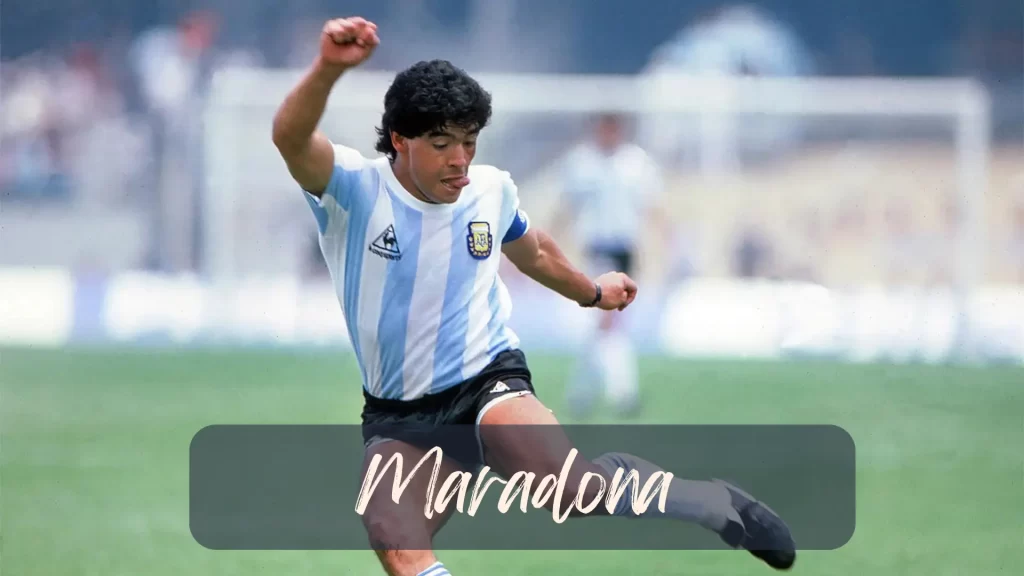
Diego Maradona: A Footballing Legend
Diego Armando Maradona, a name synonymous with brilliance, passion, and controversy, is widely regarded as one of the greatest footballers of all time. His career, spanning over two decades, was an unforgettable spectacle, filled with moments of magic on the pitch and personal struggles off it.
Early Life and Rise to Stardom
Born in Argentina in 1960, Maradona’s talent became evident at a young age. His exceptional dribbling skills and vision captivated audiences, and by the age of 16, he was already playing professional football. His early career was marked by success in his native Argentina, but it was on the international stage that he truly cemented his legacy.
Leading Argentina to World Cup Glory
The 1986 FIFA World Cup in Mexico became Maradona’s defining moment. He captained Argentina, leading them on a dominant run that culminated in a thrilling victory in the final against West Germany. The tournament was etched in history for two of Maradona’s most iconic goals: the controversial “Hand of God” and the sublime “Goal of the Century,” a weaving solo run that left a trail of bewildered defenders in his wake.
Club Career Accolades
Maradona’s brilliance wasn’t limited to international football. He achieved remarkable success at the club level, starring for teams like Boca Juniors in Argentina, Barcelona in Spain, and most notably, Napoli in Italy. He led Napoli, a team from southern Italy with a history of underachievement, to their first-ever Serie A title in 1987. His impact on the city of Naples was immense, becoming a beloved figure who transcended the sport.
Beyond the Pitch
Maradona’s legacy is complex. His personal struggles with drugs and his controversial personality often overshadowed his genius on the pitch. However, there’s no denying his impact on the beautiful game. His incredible skill, coupled with his unyielding passion, inspired generations of players and fans alike.
A Lasting Legacy
Diego Maradona passed away in 2020, leaving behind a legacy that will continue to be debated and celebrated. He was a flawed genius, a player who defied expectations and redefined footballing greatness. His story is a testament to the power of talent, passion, and the enduring magic of the beautiful game.
3. Pele
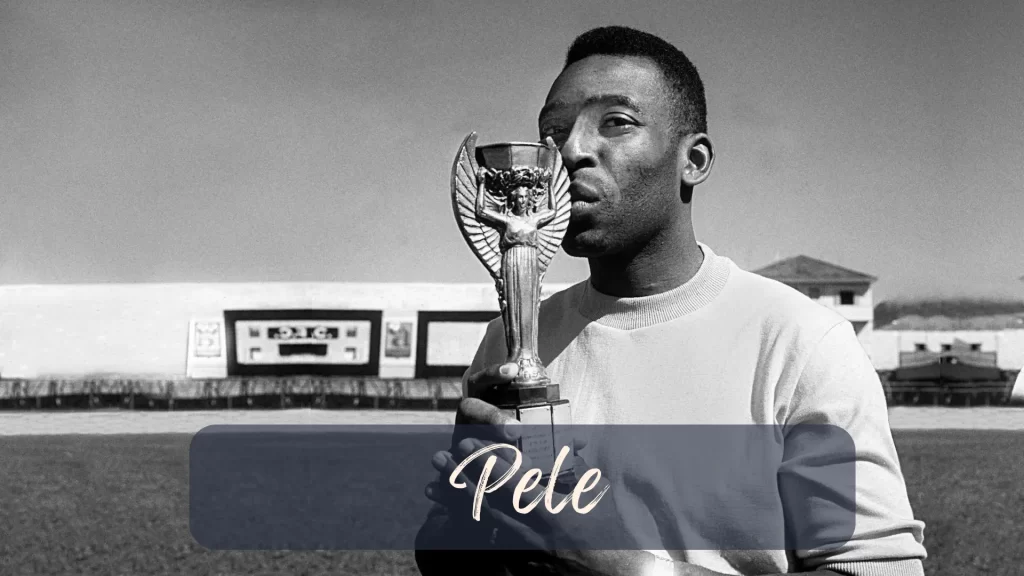
The King: A Look at Pelé’s Legendary Football Career
Pelé. The name itself evokes images of dazzling footwork, impossible goals, and a player who transcended the beautiful game. Widely regarded as the greatest footballer of all time, Edson Arantes do Nascimento, or Pelé as the world knows him, carved a legacy that continues to inspire generations.
A Star is Born
Born in 1940 in Três Corações, Brazil, Pelé’s talent blossomed amidst poverty. He honed his skills playing on dirt fields, showcasing an innate ability with the ball. By 15, he was already playing professionally for Santos FC, captivating audiences with his speed, agility, and a seemingly endless supply of goals.
World Cup Glory
Pelé’s true ascension to legend came on the world stage. At the tender age of 17, he defied expectations by starring in Brazil’s 1958 World Cup victory. His dazzling performances, including a hat-trick in the semi-final, announced the arrival of a new superstar.
Injury hampered him in 1962, but Pelé returned in 1970 to lead Brazil to a historic third World Cup title. His leadership and inspiring play cemented his status as a national hero and a global icon.
A Career Filled with Records
Pelé’s trophy cabinet is overflowing. He holds the Guinness World Record for most career goals, with a staggering total exceeding 1,200. His three World Cup wins remain unmatched by any other player. Individual accolades followed him throughout his career, including being named Athlete of the Century by the International Olympic Committee.
Beyond the Pitch
Pelé’s influence extended far beyond the football pitch. He became a global ambassador for the sport, using his fame to promote peace and social justice. His retirement in 1977 did not diminish his impact. He continued to be a vocal advocate for the sport and a source of inspiration for aspiring players.
The King’s Legacy
Pelé’s legacy is undeniable. He is more than just a footballer; he is a cultural icon whose impact transcended borders and languages. His electrifying style of play, coupled with his humility and dedication, continues to inspire players and fans alike. As long as the beautiful game is played, the legend of Pelé, the King of Football, will endure.
2. Cristiano Ronaldo
Cristiano Ronaldo: A Footballing Colossus
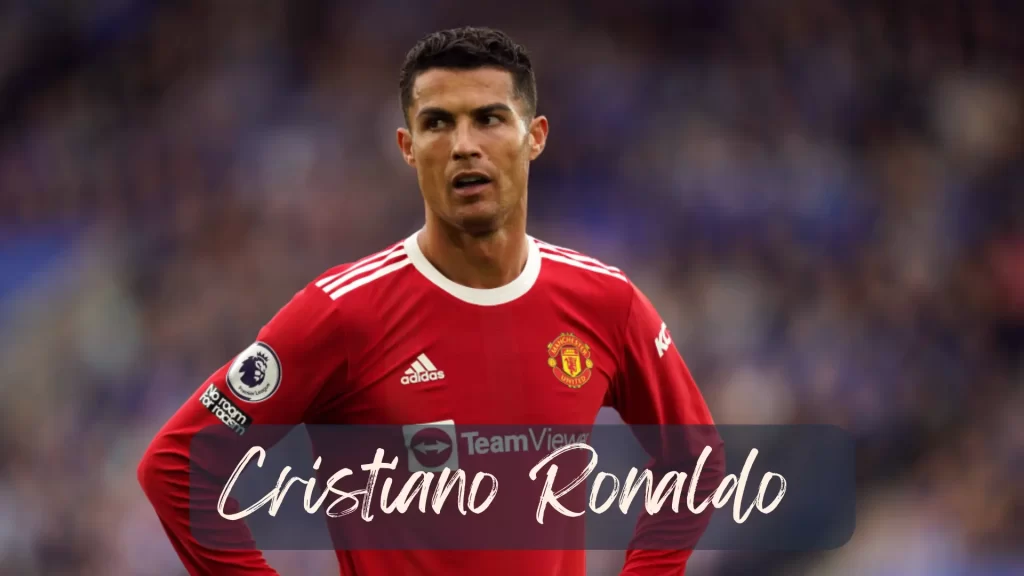
Cristiano Ronaldo dos Santos Aveiro, or simply Cristiano Ronaldo, needs little introduction. Widely regarded as one of the greatest footballers of all time, his name is synonymous with goals, trophies, and relentless dedication. This article delves into the illustrious career of this Portuguese phenomenon, exploring his achievements that have cemented his legendary status.
Early Days and Rise to Stardom:
Born in 1985, Ronaldo’s talent was evident from a young age. He honed his skills in his native Portugal before catching the eye of Manchester United, where Sir Alex Ferguson, a legendary manager himself, saw a diamond in the rough. At Manchester United, Ronaldo blossomed under Ferguson’s tutelage, winning his first Ballon d’Or award (recognizing the best player in the world) in 2008. His dazzling footwork, powerful shot, and ever-evolving skillset made him a nightmare for defenders and a joy to watch for fans.
Real Madrid Reign and Rivalry with Messi:
In 2009, Ronaldo embarked on a new chapter, joining Real Madrid for a then-world record transfer fee. It was here that his rivalry with Lionel Messi, another all-time great, truly ignited. Both players pushed each other to ever greater heights, shattering goalscoring records and leading their respective teams to numerous trophies. Ronaldo’s trophy cabinet continued to overflow during his time at Real Madrid, adding four more Ballon d’Or awards and a staggering four Champions League titles (the most prestigious club competition in Europe).
Juventus and Beyond:
In 2018, Ronaldo sought a fresh challenge, joining Italian giants Juventus. While his goalscoring prowess continued, his focus shifted slightly, leading the team to two Serie A titles (Italian league championship). In 2021, he returned to Manchester United, the club where it all began.
International Glory:
Ronaldo’s impact extends beyond club football. He captains the Portuguese national team and led them to their first-ever major international trophy at the 2016 European Championships. He is also the all-time leading scorer in international men’s football, a testament to his relentless pursuit of excellence.
Beyond the Numbers:
Ronaldo’s achievements are staggering. He holds the record for most Champions League goals (140) and most international goals (128). He is the only player to win the Ballon d’Or with two different clubs. However, his influence goes beyond mere statistics. He is a role model for aspiring athletes, a symbol of hard work and dedication, and a leader who inspires his teammates to achieve greatness.
A Legacy Secured:
Cristiano Ronaldo’s journey is still ongoing, but his legacy is already secure. He is a true footballing icon, an inspiration to millions, and a player whose name will forever be etched in the annals of football history.
1. Lionel Messi

Lionel Messi: The Magician with the Golden Boot
Lionel Messi, a name synonymous with brilliance and elegance on the football pitch, needs little introduction. Widely regarded as one of the greatest footballers of all time, Messi’s achievements speak volumes about his exceptional talent and unwavering dedication to the sport.
Born in Argentina in 1987, Messi’s journey began at a young age. His diminutive stature, however, hid an extraordinary talent. His dribbling skills were mesmerizing, his passing precise, and his finishing lethal. This raw talent caught the eye of FC Barcelona, who brought him to Spain at the tender age of 13.
At Barcelona, Messi blossomed under the guidance of renowned coaches. He quickly rose through the ranks, making his professional debut in 2004 at the age of 17. What followed was a period of unprecedented dominance. Alongside Xavi and Iniesta, Messi formed a formidable attacking trio that terrorized defences for years.
A Trophy Cabinet Overflowing with Gold
Messi’s trophy cabinet is a testament to his relentless pursuit of excellence. He has won a staggering:
Record eight Ballon d’Or awards, the most prestigious individual honour in football.
Ten La Liga titles with Barcelona, the most by any player in the league’s history.
Four UEFA Champions League titles, including a historic treble in 2015 (Champions League, La Liga, and Copa del Rey).
Seven Copa del Rey titles with Barcelona.
Individual Accolades and Records
Messi’s individual accolades are equally impressive. He is the all-time leading scorer for:
La Liga (474 goals)
FC Barcelona (672 goals)
Argentina (106 goals)
He also holds the record for most European Golden Shoes (six), awarded to the top goalscorer in European league competitions. Messi’s ability to create and score goals is unmatched, leaving a trail of mesmerizing dribbles, audacious chips, and thunderous strikes in his wake.
Beyond Club Success: A Champion for Argentina
While club football brought him immense success, Messi’s international career yearned for a major trophy. After leading Argentina to a runners-up finish in the 2014 World Cup, he finally achieved his dream in 2021, captaining Argentina to victory in the Copa América. In 2022, he added another prestigious title, leading Argentina to victory in the FIFA World Cup, once again claiming the Golden Ball award for the tournament’s best player.
A Legacy Beyond Statistics
Lionel Messi is more than just statistics and trophies. He is an artist on the pitch, weaving magic with his left foot. His vision, control and passing ability make him a joy to watch. His dedication to the sport and his humble demeanour inspire millions around the globe.
Whether Messi continues to add to his already remarkable legacy remains to be seen. However, one thing is certain: his place among the footballing greats is forever secured.



